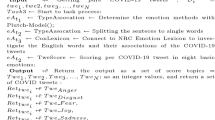Abstract
Analyzing and understanding the relation of emotions and human computing interaction has become a necessity today. Indeed, sentiment analysis tools have gained special attention during the last years in order to facilitate and support the understanding and study of human affections. In this paper, we analyze an important Chilean tax fraud case by combining sentiment analysis and critical discourse analysis. We take as a case study, the tweets of the year 2018 that contain the #SQM hashtag. This case involves tax fraud and violations of political campaign laws. People from different political parties created fake invoices, which are then paid by SQM to be illegally used onto political parties violating campaign finance laws. Interesting results are obtained where we identify which topics and persons have a negative or positive connotation in the readers.
Access this chapter
Tax calculation will be finalised at checkout
Purchases are for personal use only
Similar content being viewed by others
References
Fairclough, N.: El análisis crítico del discurso como método para la investigación en Ciencias Sociales. In: Wodak, R., Meyer, M. (eds.) Métodos de análisis crítico del discurso, pp. 179–203. Gedisa, Barcelona (2003)
Buimer, H.P., Bittner, M., Kostelijk, T., van der Geest, T.M., van Wezel, R.J.A., Zhao, Y.: Enhancing emotion recognition in VIPs with haptic Feedback. In: Stephanidis, C. (ed.) HCI 2016. CCIS, vol. 618, pp. 157–163. Springer, Cham (2016). https://doi.org/10.1007/978-3-319-40542-1_25
Thelwall, M., Buckley, K., Paltoglou, G., Cai, D., Kappas, A.: Sentiment strength detection in short informal texts. J. Am. Soc. Inf. Sci. Technol. 61, 2544–2558 (2010)
Author information
Authors and Affiliations
Corresponding author
Editor information
Editors and Affiliations
Rights and permissions
Copyright information
© 2019 Springer Nature Switzerland AG
About this paper
Cite this paper
Niklander, S. (2019). Emotion Recognition in Social Media: A Case Study About Tax Frauds. In: Stephanidis, C. (eds) HCI International 2019 - Posters. HCII 2019. Communications in Computer and Information Science, vol 1034. Springer, Cham. https://doi.org/10.1007/978-3-030-23525-3_6
Download citation
DOI: https://doi.org/10.1007/978-3-030-23525-3_6
Published:
Publisher Name: Springer, Cham
Print ISBN: 978-3-030-23524-6
Online ISBN: 978-3-030-23525-3
eBook Packages: Computer ScienceComputer Science (R0)




